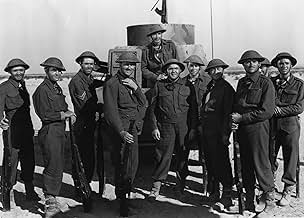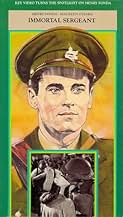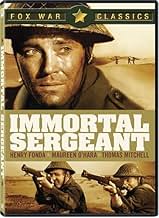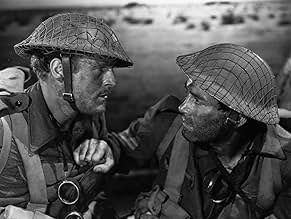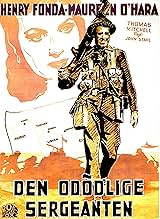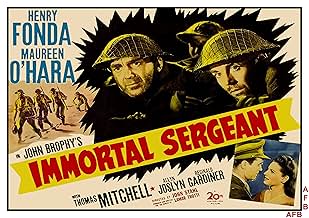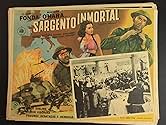VALUTAZIONE IMDb
6,6/10
1121
LA TUA VALUTAZIONE
Aggiungi una trama nella tua linguaDuring a WW2 patrol in the North-African desert, a Canadian corporal reminisces about his sweetheart and must lead his platoon when the sergeant gets wounded.During a WW2 patrol in the North-African desert, a Canadian corporal reminisces about his sweetheart and must lead his platoon when the sergeant gets wounded.During a WW2 patrol in the North-African desert, a Canadian corporal reminisces about his sweetheart and must lead his platoon when the sergeant gets wounded.
- Premi
- 3 vittorie totali
John Banner
- Officer
- (non citato nei titoli originali)
Wilson Benge
- Waiter
- (non citato nei titoli originali)
Ted Billings
- Man at Train Depot as Soldiers Return
- (non citato nei titoli originali)
Lane Bradford
- Returning Soldier
- (non citato nei titoli originali)
James Carlisle
- Party Guest
- (non citato nei titoli originali)
Gordon B. Clarke
- Soldier
- (non citato nei titoli originali)
Ruth Clifford
- Nightclub Patron
- (non citato nei titoli originali)
James Craven
- NCO
- (non citato nei titoli originali)
Oliver Cross
- Nightclub Patron
- (non citato nei titoli originali)
Jack Deery
- Party Guest
- (non citato nei titoli originali)
Recensioni in evidenza
1943's The Immortal Sergeant is a tedious and overly melodramatic bit of dullness that makes you glad we won WWII. But how?
I never got a chance to suspend my disbelief with this movie. Every moment I saw characters running hither and yon, pursuing Nazis or being strafed, I reacted with a dull, throbbing irritation. The movie is so drab that whatever does get done right gets lost in the wrong.
Henry Fonda, the young Canadian soldier in the Royal Army, is such a wussburger, he's willing to let Maureen O'Hara go to a teddibly uppa-crust war correspondent (Allyn Joslyn) instead of popping him in the nose. He whines to his sergeant (the immortal one--Thomas Sullivan) that he can't have a rank of responsibility. When he takes over the patrol, he has to quell a mutiny, slaughter a bunch of Italians and Germans, and make it back to base, all the while being crippled by some of the most boring flashbacks I've ever seen.
By the time our hero gets a medal pinned on his hospital robe (yeah, he makes it), he has turned in to a nasty, kill-em-all-and-let-God- sort-them-out candidate for a commission. He tells the teddible war correspondent that if he doesn't get a letter to O'Hara telling her he wants to marry her, he'll murder the journalist friend.
Sheesh, not "I'll smack ya in the kisser" or "I'll dance on your head, but "I'll murder you."
So much for Mr. Nice Wussburger. I think I liked him better.
The Immortal Sergeant didn't teach that to Corporal Jackass.
I never got a chance to suspend my disbelief with this movie. Every moment I saw characters running hither and yon, pursuing Nazis or being strafed, I reacted with a dull, throbbing irritation. The movie is so drab that whatever does get done right gets lost in the wrong.
Henry Fonda, the young Canadian soldier in the Royal Army, is such a wussburger, he's willing to let Maureen O'Hara go to a teddibly uppa-crust war correspondent (Allyn Joslyn) instead of popping him in the nose. He whines to his sergeant (the immortal one--Thomas Sullivan) that he can't have a rank of responsibility. When he takes over the patrol, he has to quell a mutiny, slaughter a bunch of Italians and Germans, and make it back to base, all the while being crippled by some of the most boring flashbacks I've ever seen.
By the time our hero gets a medal pinned on his hospital robe (yeah, he makes it), he has turned in to a nasty, kill-em-all-and-let-God- sort-them-out candidate for a commission. He tells the teddible war correspondent that if he doesn't get a letter to O'Hara telling her he wants to marry her, he'll murder the journalist friend.
Sheesh, not "I'll smack ya in the kisser" or "I'll dance on your head, but "I'll murder you."
So much for Mr. Nice Wussburger. I think I liked him better.
The Immortal Sergeant didn't teach that to Corporal Jackass.
In his memoirs Henry Fonda hated this film above all others that he did in his career. That's taking in quite a bit of territory because Fonda did some dreadful stuff in the seventies like Tentaccoli with a giant octopus. A lot of this was done for the money and Fonda with five wives certainly had much expenses in alimony.
But Immortal Sergeant held a place dear in his heart because of the head of 20th Century Fox, Darryl F. Zanuck. Back in 1940 in order to get the part of Tom Joad, Fonda made a faustian deal with Zanuck signing his only studio contract. The studio cast him in what he considered junk. The good films he made in that four year stretch were on loan out, to Paramount for The Lady Eve, to Warner Brothers for The Male Animal, to RKO for The Big Street. He was not fond of what Fox cast him in for the most part because he got what was left after Tyrone Power and Don Ameche rejected it.
Anyway come 1943 Fonda had two objectives, to make The Oxbow Incident because he knew that would be a classic and to enlist in World War II as pal Jimmy Stewart did. He prevailed on Zanuck to do The Oxbow Incident and it was a cheaply made western, classic though it was because it was shot completely on the sound stage.
Then Zanuck cajoled, begged, and pleaded with him to make this one more film which he said was a great propaganda piece one that would tear the hearts of the movie going public and rally the homefront and be an inspiration to the fighting troops.
When Immortal Sergeant proved somewhat less than that, Fonda felt hoodwinked and gritted his teeth and finished the film. He tried in fact to enlist to get out of it and Zanuck had so much pull in Washington, DC, Fonda kept getting his enlistment postponed.
It was one angry Henry Fonda who finished The Immortal Sergeant and then went to war. His experience with this film made him bound and determined to get out of his contract one way or another. Ultimately he left Hollywood in 1948 when he got a great Broadway role in Mister Roberts. Fonda didn't return to Hollywood until 1955 and then to make the screen version of Mister Roberts.
But that's getting away from Immortal Sergeant. Without Henry Fonda's rather colored viewpoint of the situation let me say it's not the worst World War II flag waver the studios put out. As is usual Henry Fonda is a Canadian to explain his non-British speech who has enlisted in the British army and is serving in North Africa. He's a young man with a lot of angst and when his patrol's sergeant is killed, Fonda has to summon something from within to bring the men back to their lines.
Thomas Mitchell is the sergeant and Maureen O'Hara is Fonda's girl back home and both do a creditable job.
For the rest of his life Fonda would foam at the mention of Immortal Sergeant. Being the professional he was, he did a good job in the film.
But Immortal Sergeant hardly belongs in the same company as The Oxbow Incident and Mister Roberts in the works of Henry Fonda.
But Immortal Sergeant held a place dear in his heart because of the head of 20th Century Fox, Darryl F. Zanuck. Back in 1940 in order to get the part of Tom Joad, Fonda made a faustian deal with Zanuck signing his only studio contract. The studio cast him in what he considered junk. The good films he made in that four year stretch were on loan out, to Paramount for The Lady Eve, to Warner Brothers for The Male Animal, to RKO for The Big Street. He was not fond of what Fox cast him in for the most part because he got what was left after Tyrone Power and Don Ameche rejected it.
Anyway come 1943 Fonda had two objectives, to make The Oxbow Incident because he knew that would be a classic and to enlist in World War II as pal Jimmy Stewart did. He prevailed on Zanuck to do The Oxbow Incident and it was a cheaply made western, classic though it was because it was shot completely on the sound stage.
Then Zanuck cajoled, begged, and pleaded with him to make this one more film which he said was a great propaganda piece one that would tear the hearts of the movie going public and rally the homefront and be an inspiration to the fighting troops.
When Immortal Sergeant proved somewhat less than that, Fonda felt hoodwinked and gritted his teeth and finished the film. He tried in fact to enlist to get out of it and Zanuck had so much pull in Washington, DC, Fonda kept getting his enlistment postponed.
It was one angry Henry Fonda who finished The Immortal Sergeant and then went to war. His experience with this film made him bound and determined to get out of his contract one way or another. Ultimately he left Hollywood in 1948 when he got a great Broadway role in Mister Roberts. Fonda didn't return to Hollywood until 1955 and then to make the screen version of Mister Roberts.
But that's getting away from Immortal Sergeant. Without Henry Fonda's rather colored viewpoint of the situation let me say it's not the worst World War II flag waver the studios put out. As is usual Henry Fonda is a Canadian to explain his non-British speech who has enlisted in the British army and is serving in North Africa. He's a young man with a lot of angst and when his patrol's sergeant is killed, Fonda has to summon something from within to bring the men back to their lines.
Thomas Mitchell is the sergeant and Maureen O'Hara is Fonda's girl back home and both do a creditable job.
For the rest of his life Fonda would foam at the mention of Immortal Sergeant. Being the professional he was, he did a good job in the film.
But Immortal Sergeant hardly belongs in the same company as The Oxbow Incident and Mister Roberts in the works of Henry Fonda.
Henry Fonda looks just like he appeared in 1940's "The Grapes of Wrath."
This is quite a good film detailing several soldiers caught in Africa during World War 11 and how they eventually overcome their perils.
Thomas Mitchell, as the old-time sergeant is a standout here. There is able support by Allyn Joslyn, Reginald Gardiner and others.
Maureen O'Hara is used mainly in flashbacks here as Fonda thinks back of his past while trying to lead his men to freedom.
The ending seems rushed up as Fonda wakes up in the hospital and is told how they got out of their predicament.
This is quite a good film detailing several soldiers caught in Africa during World War 11 and how they eventually overcome their perils.
Thomas Mitchell, as the old-time sergeant is a standout here. There is able support by Allyn Joslyn, Reginald Gardiner and others.
Maureen O'Hara is used mainly in flashbacks here as Fonda thinks back of his past while trying to lead his men to freedom.
The ending seems rushed up as Fonda wakes up in the hospital and is told how they got out of their predicament.
Some films age well, while others get noticeably worse over the years. This film falls into the second category. First, we are asked to believe that Henry Fonda is British; please. Then, we have to subjected to Thomas Mitchell, one of the worst character actors in the history of film. He always played a mischievous Irishman; how creative.
Fonda is always good; regardless of his vehicles in film and Sullivan is believable (but not as a Brit).
The production crew made a few mistakes; like the desert being sweaty at night; it is cool in the desert at night, and unbearingly hot in the day.
This leads to a few other holes in the plot. After the crew attacks and kills a German crew, why didn't they take THEIR food and water? Duh.
Second error. Why not kill the Germans while they are sleeping instead of foraging for food and water? They would have been a lot easier to kill sleeping, rather than awake and walking around with their weapons. Sorry, no sale. Had very little to do with real desert warfare.
Fonda is always good; regardless of his vehicles in film and Sullivan is believable (but not as a Brit).
The production crew made a few mistakes; like the desert being sweaty at night; it is cool in the desert at night, and unbearingly hot in the day.
This leads to a few other holes in the plot. After the crew attacks and kills a German crew, why didn't they take THEIR food and water? Duh.
Second error. Why not kill the Germans while they are sleeping instead of foraging for food and water? They would have been a lot easier to kill sleeping, rather than awake and walking around with their weapons. Sorry, no sale. Had very little to do with real desert warfare.
This is the first American film about the North Africa campaign and the last film Henry Fonda made before reporting for the war. In fact he had tried to report earlier but studio head Zanuck had him deferred until this film was made.
"The Immortal Sergeant" tells the oft-told tale of a group of soldiers at risk trying to survive. The first version I can recall was "the Lost Patrol" a 1929 British silent film remade in 1934 by John Ford. Those films were based on the 1927 novel "Patrol" and the basic theme has been repeated since (e.g., 'The Thirteen", "Sahara", "Last of the Comanches", "Kokoda").
This 1943 film is an American propaganda film using the British fighting in Africa for the setting. Though this is obviously a studio film, the camera work is pretty good and some of the action sequences look good.
The cast is rich with 40s stars like Henry Fonda, Thomas Mitchell, Maureen O'Hara, and Reginald Gardiner. But they are merely going through the motions and there is nothing here you haven't seen before.
My favorite WW 2 fighting films made between 1942 and 1944 include "Wake Island" (1942), "Bataan" (1943) which also had Mitchell, "The Fighting Sullivans" (1944), "Flying Tigers" (1942), "Guadalcanal Diary" (1943), "The North Star" (1943), "The Rats of Tobruk" (1944), and "Thirty Seconds Over Tokyo" (1944).
There are a plethora of non-fighting WW 2 films that are worthy of mention – "Casablanca" (1942), "Lifeboat" (1944), "Hangmen Also Die" (1943), and "Five Graves to Cairo" (1943).
"The Immortal Sergeant" tells the oft-told tale of a group of soldiers at risk trying to survive. The first version I can recall was "the Lost Patrol" a 1929 British silent film remade in 1934 by John Ford. Those films were based on the 1927 novel "Patrol" and the basic theme has been repeated since (e.g., 'The Thirteen", "Sahara", "Last of the Comanches", "Kokoda").
This 1943 film is an American propaganda film using the British fighting in Africa for the setting. Though this is obviously a studio film, the camera work is pretty good and some of the action sequences look good.
The cast is rich with 40s stars like Henry Fonda, Thomas Mitchell, Maureen O'Hara, and Reginald Gardiner. But they are merely going through the motions and there is nothing here you haven't seen before.
My favorite WW 2 fighting films made between 1942 and 1944 include "Wake Island" (1942), "Bataan" (1943) which also had Mitchell, "The Fighting Sullivans" (1944), "Flying Tigers" (1942), "Guadalcanal Diary" (1943), "The North Star" (1943), "The Rats of Tobruk" (1944), and "Thirty Seconds Over Tokyo" (1944).
There are a plethora of non-fighting WW 2 films that are worthy of mention – "Casablanca" (1942), "Lifeboat" (1944), "Hangmen Also Die" (1943), and "Five Graves to Cairo" (1943).
Lo sapevi?
- QuizAccording to TCM's Robert Osborne, this was the last film Henry Fonda worked on before enlisting in the U.S. Navy during World War II.
- BlooperWhen the survivors come across the vehicle tracks after the attack on the Italian armoured car, multiple shadows of the soldiers can be seen, indicating multiple light sources.
- Citazioni
Sgt. Kelly: Drinking water is the worst thing in the world for a wound like mine.
[in the groin]
- ConnessioniEdited into All This and World War II (1976)
- Colonne sonoreThe Campbells Are Coming
(uncredited)
Traditional
Played on the bagpipes at the beginning
I più visti
Accedi per valutare e creare un elenco di titoli salvati per ottenere consigli personalizzati
- How long is Immortal Sergeant?Powered by Alexa
Dettagli
- Tempo di esecuzione
- 1h 31min(91 min)
- Colore
- Proporzioni
- 1.37 : 1
Contribuisci a questa pagina
Suggerisci una modifica o aggiungi i contenuti mancanti


